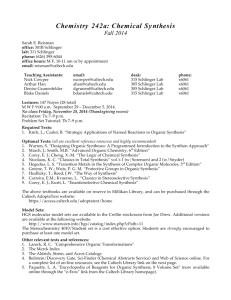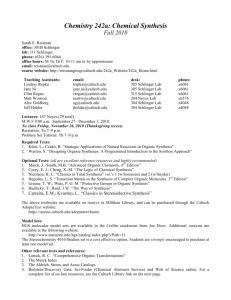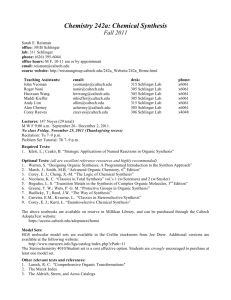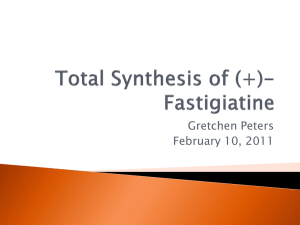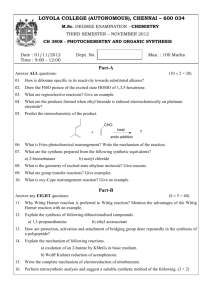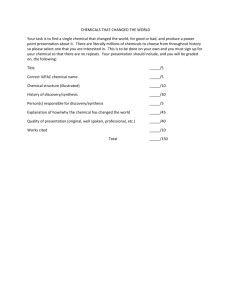Chemistry 242a: Chemical Synthesis
advertisement
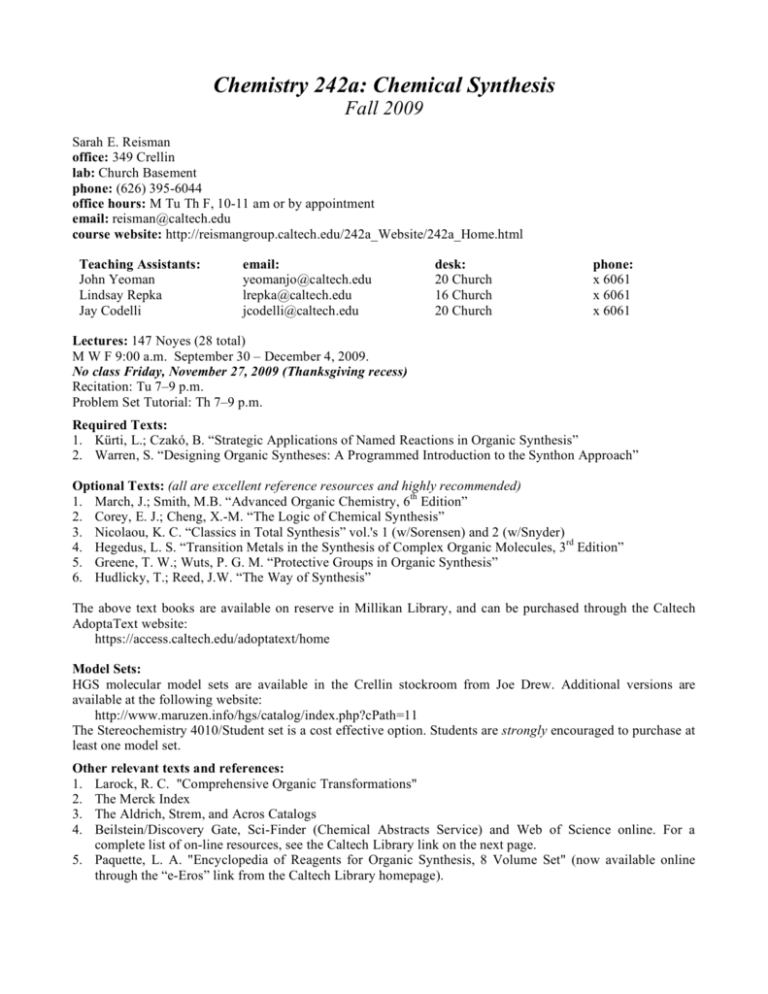
Chemistry 242a: Chemical Synthesis Fall 2009 Sarah E. Reisman office: 349 Crellin lab: Church Basement phone: (626) 395-6044 office hours: M Tu Th F, 10-11 am or by appointment email: reisman@caltech.edu course website: http://reismangroup.caltech.edu/242a_Website/242a_Home.html Teaching Assistants: John Yeoman Lindsay Repka Jay Codelli email: yeomanjo@caltech.edu lrepka@caltech.edu jcodelli@caltech.edu desk: 20 Church 16 Church 20 Church phone: x 6061 x 6061 x 6061 Lectures: 147 Noyes (28 total) M W F 9:00 a.m. September 30 – December 4, 2009. No class Friday, November 27, 2009 (Thanksgiving recess) Recitation: Tu 7–9 p.m. Problem Set Tutorial: Th 7–9 p.m. Required Texts: 1. Kürti, L.; Czakó, B. “Strategic Applications of Named Reactions in Organic Synthesis” 2. Warren, S. “Designing Organic Syntheses: A Programmed Introduction to the Synthon Approach” Optional Texts: (all are excellent reference resources and highly recommended) 1. March, J.; Smith, M.B. “Advanced Organic Chemistry, 6th Edition” 2. Corey, E. J.; Cheng, X.-M. “The Logic of Chemical Synthesis” 3. Nicolaou, K. C. “Classics in Total Synthesis” vol.'s 1 (w/Sorensen) and 2 (w/Snyder) 4. Hegedus, L. S. “Transition Metals in the Synthesis of Complex Organic Molecules, 3rd Edition” 5. Greene, T. W.; Wuts, P. G. M. “Protective Groups in Organic Synthesis” 6. Hudlicky, T.; Reed, J.W. “The Way of Synthesis” The above text books are available on reserve in Millikan Library, and can be purchased through the Caltech AdoptaText website: https://access.caltech.edu/adoptatext/home Model Sets: HGS molecular model sets are available in the Crellin stockroom from Joe Drew. Additional versions are available at the following website: http://www.maruzen.info/hgs/catalog/index.php?cPath=11 The Stereochemistry 4010/Student set is a cost effective option. Students are strongly encouraged to purchase at least one model set. Other relevant texts and references: 1. Larock, R. C. "Comprehensive Organic Transformations" 2. The Merck Index 3. The Aldrich, Strem, and Acros Catalogs 4. Beilstein/Discovery Gate, Sci-Finder (Chemical Abstracts Service) and Web of Science online. For a complete list of on-line resources, see the Caltech Library link on the next page. 5. Paquette, L. A. "Encyclopedia of Reagents for Organic Synthesis, 8 Volume Set" (now available online through the “e-Eros” link from the Caltech Library homepage). Chemistry Library Web Site: http://library.caltech.edu/collections/chemistry.htm Problem Sets: Problem Sets will be distributed on Fridays and are due by 7:00 p.m. on the following Thursday night; a weekly problem session will be held on Thursday evenings in 147 Noyes beginning at 7:00 pm. Students will be expected to discuss their answers to the problems at the board. This will be the only opportunity to see the solutions to the problem sets. Reading selections from Warren’s “Designing Organic Syntheses” are assigned in the syllabus weekly. You must complete the assigned pages by the specified date in this syllabus. This work must be completed individually. The evening sessions are optional for undergraduates enrolled in 242a, however attendance and participation is strongly encouraged. Extra credit will be awarded to undergraduates for participation. Synthesis Project: Each student will be assigned a molecule for which they must design and propose a total synthesis. A 1-page schematic rough draft your retro-synthetic analysis will be due Friday, October 30th. A two page written proposal will be due on Monday, November 30th. Each student will give a 7-minute presentation of his or her synthetic route during either the December 1 st (Tuesday) or 3rd (Thursday) evening session. Molecule assignments and further details will be distributed on Friday, October 2nd. Name Reactions: There are a number of key reactions in organic chemistry that have become identified by a name (either a person or a specific transformation). Knowledge of these reactions is fundamental to your success in this class. You should learn each of the reactions listed by the date indicated on the name reactions handout at the end of this syllabus. They will appear on exams and problem sets in a timely fashion. Current Literature: The state of chemical synthesis is highly dynamic and changes on a daily basis. In order to keep pace with new developments, part of the requirement of this course will be to stay abreast of new and particularly relevant publications in the primary synthetic literature. Students will be required to read the primary literature, and distill out pertinent developments and report them back to the class. This important exercise will take place during the Thursday problem sessions. Members of the class will be given a playing card, and during the session a deck of cards will be cut and two students with the matching cards will present a synopsis of a relevant communication from a recent issue of J. Am. Chem. Soc., Angew. Chem. Int. Ed., Org. Lett., J. Org. Chem., or Tetrahedron Lett. Be sure to include the primary author, institution affiliation and proper reference in your description. This serves the purpose of not only keeping the class current, but also will help students to launch their own database of relevant chemical literature. Exams: There will be two midterm exams and a comprehensive final. The exams will be take-home and in some cases outside resources may be consulted (e.g., class notes). Please follow the instructions precisely as they are given on each exam. Exam Due Dates: Monday, October 26, 2009 - 9 AM Monday, November 23, 2009 - 9 AM Final Exam Due Date: Friday, December 11, 2009 - 9 AM Course Grade: The course grade will be based on midterm exams (40%), problem sets and discussion (10%), synthesis proposal (15%), and the final exam (35%). Extra credit will be awarded to undergraduates for participation in problem discussions (up to 10%). Course Syllabus: Chem 242a class date topic course work due 1W 2F 9/30 10/2 retrosynthetic analysis synthesis Friday PS #1 due (10/1) 3M 4W 5F 10/5 10/7 10/9 conformational analysis conformational analysis synthesis Friday PS #2 due (10/8), Warren p. 1-75 6M 7W 8F 10/12 10/14 10/16 oxidation oxidation stereoselective oxidation PS #3 due (10/15), Warren p. 77-130 9M 10W 11F 10/19 10/21 10/23 synthesis Monday stereoselective oxidation stereoselective oxidation 12M 13W 14F 10/26 10/28 10/30 hydrogenation stereoselective hydrogenation synthesis Friday 15M 16W 17F 11/2 11/4 11/6 carbonyl reduction carbonyl addition synthesis Friday PS #5 due (11/5), Warren p. 173-200 18M 19W 20F 11/9 11/11 11/13 enolates enolate alkylation synthesis Friday PS #6 due (11/12), Warren p. 201-254 21M 22W 23F 11/16 11/18 11/20 aldol asymmetric aldol stereoselective allylation 24M 25W 11/23 11/25 stereoselective allylation synthesis Wednesday midterm #2 due 26M 11/30 metal carbenoids syn. prop due; presentations on 12/1 and 12/3 27W 28F 12/2 12/4 transition metal cat. C–C bond formation synthesis Friday 12/11 PS #4 due (10/22), Warren p.131-172 midterm #1 out midterm #1 due syn. prop retro due PS #7 due (11/19) midterm #2 out final exam out final exam due Name Reactions Below are some name reactions that are of importance in synthetic organic chemistry. You are expected to know the overall transformation and a reasonable mechanism for each reaction by the date indicated. Good references: L. Kürti, B. Czakó, “Strategic Applications of Named Reactions in Organic Synthesis” J. March, M.B. Smith, "Advanced Organic Chemistry, 6th Edition" J. J. Li, "Name Reactions" Websites: http://www.organic-chemistry.org/namedreactions/ http://www.monomerchem.com/display4.html 10/2 Aldol reaction Mannich reaction Diels-Alder reaction Alder ene reaction Michael addition Robinson annulation Dieckmann condensation Grignard reaction Swern oxidation Jones oxidation 10/9 Fischer indole synthesis Pummerer rearrangment Beckmann rearrangement Curtius rearrangement Hofmann rearrangement Bamford-Stevens reaction 10/16 Baeyer-Villiger oxidation Rubottom oxidation Oppenauer oxidation Meerwein-Ponndorf-Verley reduction Wacker oxidation Tamao-Fleming oxidation Tischenko reduction Luche reduction Wittig reaction Horner-Wadsworth-Emmons reaction 10/23 Claisen rearrangement Cope rearrangement Ireland-Claisen rearrangement Oxy-Cope rearrangement Overman rearrangement Aza-Cope Mannich reaction Mislow-Evans rearrangement Prins-Pinacol rearrangement 10/30 Brook rearrangement Corey-House reaction Julia-Lythgoe olefination Wharton alkene synthesis Peterson olefination Chugaev Reaction Saegusa-Ito oxidation 11/6 Arndt-Eistert homologation Wolff rearrangement Neber Rearrangement Henry reaction Simmons-Smith reaction Wolff-Kischner Reduction 11/13 Knoevenagel reaction Mukaiyama Aldol reaction Sakurai reaction Reformatsky reaction Favorskii rearrangement 11/20 Krapcho Decarboxylation Finkelstein reaction Hunsdiecker reaction Mitsunobu reaction Strecker reaction Barton-McCombie Deoxygenation 11/27 Grubbs olefin metathesis Stille reaction Suzuki reaction Heck reaction Negishi reaction Sonagashira reaction Tsuji-Trost allylation
